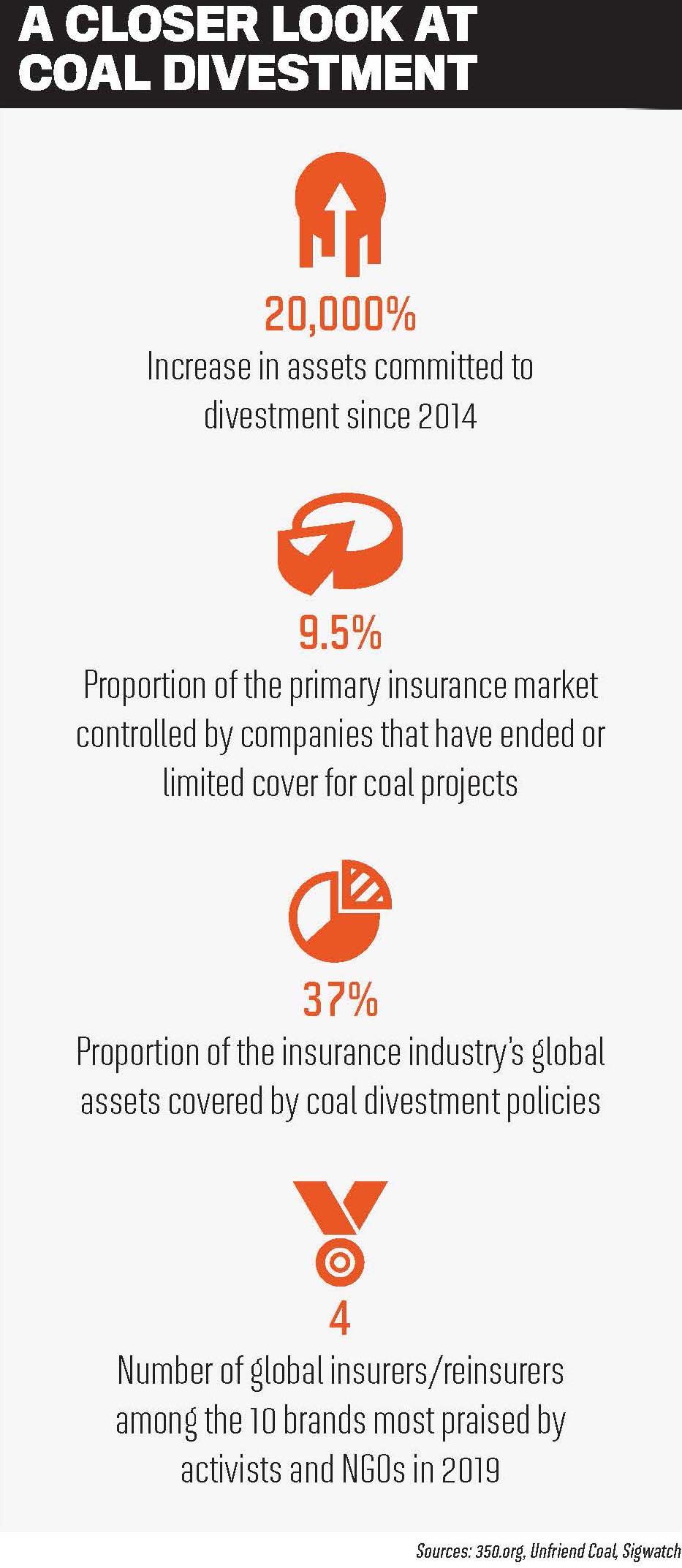

Since the 2015 Paris Agreement on combating climate change, the number of institutional investors committed to cutting fossil fuel stocks from their portfolios has risen from 180 in 2014 to more than 1,100, according to climate advocacy group 350.org.
Leading insurers have been a key part of this movement: A recent report from global research and strategy consultancy Sigwatch found that the insurance sector accounted for four out of 10 of the brands most praised by NGOs and activist groups, due in large part to insurers’ pledges regarding coal divestment.
“The bigger NGOs recognise that the financial sector is the linchpin of fossil fuel development due to the importance of insurers as institutional investors,” says Robert Blood, founder and managing director of Sigwatch. “Corporations exist far longer than governments, and in many ways, their decisions have far more long-term impact.”
“Coal is, from an insurance perspective and from an investment perspective, no longer an asset that we want to support” Martin Weymann, Swiss Re
As institutional investors and holders of substantial capital, Blood says, insurers can play a major role in directing the develop-ment of the renewable energy sector. He adds that, in addition to wielding their power as institutional investors, insurers are increas-ingly embracing sustainability in their under-writing efforts, too.
Both Zurich and Swiss Re have signed the UN Business Ambition for 1.5° C, which calls on businesses to set science-based targets with the goal of limiting the worldwide temperature increase to 1.5° Celsius. Both insurers, along with Allianz, have also joined the Net-Zero Asset Owner Alliance, committing to ensuring their investment portfolios represent net zero greenhouse gas emissions by 2050.
Swiss Re also refuses insure or reinsure any business with more than 30% expo-sure to thermal coal across all lines of business. According to Martin Weymann, head of sustainability, emerging and political risk management at Swiss Re, this threshold allows the company the flexibility to work as a partner in the transition to a low-carbon economy with organisations that are making substantial efforts in this area.
“We believe that, in the very long term, coal is, from an insurance perspective and from an investment perspective, no longer an asset that we want to support due to its environmental footprint, but also because we believe it is not attractive from an economic perspective,” Weymann says. “Wherever possible, we bring the economic and the sustainability perspectives together.”
According to Zurich’s head of sustainability, Linda Freiner, Zurich’s position on thermal coal, oil sands and oil shales was a first step in addressing carbon-intense industries. In addition to refusing to insure companies that generate more than 30% of their revenue from those industries, Zurich also pledged to work with companies that don’t meet that threshold on a transition plan. Freiner notes that thermal coal in particular is not essential to the energy mix anymore, as it can be replaced with cheaper renewable energy.
“The reality for insurers is that we cannot move faster than the real economy because we invest in the real economy and we insure the real economy,” she says. “So, where our role then becomes really important is in engaging with the carbon-intense industries to really try to help facilitate their transition.”
 Freiner adds that the threshold introduced by Zurich has been an effective means of engaging with these companies to help them work through transition plans and understand how to diversify their businesses so Zurich can insure and invest in new types of business with a much lower carbon foot-print. It was apparent which companies were moving quickly to transition, Freiner says.
Freiner adds that the threshold introduced by Zurich has been an effective means of engaging with these companies to help them work through transition plans and understand how to diversify their businesses so Zurich can insure and invest in new types of business with a much lower carbon foot-print. It was apparent which companies were moving quickly to transition, Freiner says.
“Where our role becomes really important is in engaging with the carbon-intense industries to help facilitate their transition” Linda Freiner, Zurich
“From a risk perspective, we have to ask ourselves if [these are companies] we want to do business with in the long term,” she says. “Stranded assets are a risk from both an investment and underwriting point of view.”
With regard to Swiss Re’s initiatives in responsible investing and underwriting, Weymann says the company has seen clients and peers starting to make similar moves, which he believes is creating a momentum that highlights the positive impact sustaina-bility initiatives can have on clients, investors and society at large.
“I think the whole (re)insurance industry plays a very important role by providing solutions to sustainability challenges and thus creating long-term value for its stake-holders,” he says.
Freiner likewise feels that insurance companies have an essential role to play in the move away from a carbon-centric economy. While insurance might not be feeling big pres-sure from consumers yet, she says, it’s just a matter of time before consumers expect more sustainable practices and more sustainable solutions from their insurers.
“Our role as an insurance company is really to be able to engage with our customers and incentivise them to transition and help them be part of that journey,” she says.
